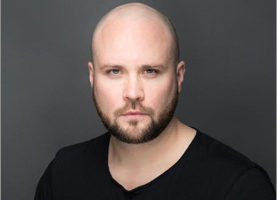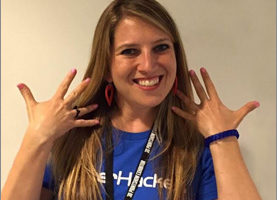Jeff Sanders wants you to get up early, but not just because he said so. While he has found vast improvements to his productivity and general well-being in having begun a regimen of getting up early in the morning, he acknowledges that each individual needs their own motivating factors to do so.
For this reason, Sanders advises that you plan something of personal value at an early hour in order to begin and maintain an early morning rhythm that will set you up for a more successful day. Listen in to learn more, including tips for your evening routine and why our attachment to modern technology can be a hindrance to our productivity, happiness, and fulfillment.
You can hear more from Sanders on his podcast, The 5 AM Miracle Podcast, which can be found at https://www.jeffsanders.com. For the readers out there, you can also check out his books, The 5 AM Miracle: Dominate Your Day Before Breakfast and The Free-Time Formula: Finding Happiness, Focus, and Productivity No Matter How Busy You Are.
Richard Jacobs: Hello, this is Richard Jacobs. I’m talking to Jeff Sanders, the founder of jeffsanders.com and the 5:00 AM miracle podcast. So Jeff, thanks for coming. How are you doing?
Jeff Sanders: I am doing pretty well. Thanks a lot.
Richard Jacobs: I guess it’s kind of funny. I’m an extreme night owl and have been for a long time. So 5:00 AM to me is like RFI. We’ll get into that. Why is the name for the podcast? 5:00 AM and what is 5:00 AM meant to you? A little bit of your background.
Jeff Sanders: Yeah, so I’m not naturally a morning person. I’m still not actually, I think for my story kind of began. I’m in my mid-twenties I had a day job, I had a marathon I was trained for, I had a side business I was trying to build, so essentially a busy life and I was trying to figure out how to squeeze in everything that I had going on and I decided to try an early morning to see if I could train for my race before work. And as it turned out, I really enjoyed waking up early to go for a run and then after that marathon was over, I continued that practice of waking up early because I had more time in my day that I felt I could get some stuff done before the day really began. And so for me, that’s kind of my story over time of figuring out the early mornings had this potential. But even though I had not naturally I personalized wake up early, I discovered that like if I got up at that time and could get things accomplished that I loved all of a sudden the rest of the day felt that much more productive. So for me, it was this epiphany that I could just change my hours of sleeping and wake up earlier and all of a sudden my day felt so much better.
Richard Jacobs: It’s kind of funny if you’re good enough and you get enough people to change to this system, they didn’t want to work anymore because everyone will be awake at 5:00 AM and bother each other, get stuff done.
Jeff Sanders: That’s a problem.
Richard Jacobs: I know it’d be a long way before that happened, but it’s good. It’s a good thing you’re doing. Alright, so you decided that this works for you. The one time, what happened from there? Did you see doing it or did you fall back and do it on occasion? Like what happened to you?
Jeff Sanders: Well over the years that I’ve kind of ebb and flow between 5:00 AM and waking up later as well as I’m not set at 5:00 AM being like the time I have to wake up. Also at the time, I began the five AM miracle I had the day job. I’m now a full-time entrepreneur so my time is more flexible than before. So to say that you know I have to get up at 5:00 AM is definitely not true. My focus and my intention is that my day is planned on purpose and so if I can get out of bed at an ideal time for that day, whenever that time happens to be, then that’s ideal. So I’m, I’m not striving for early mornings for the sake of early mornings. I just want to make sure that whatever the next day is presented with the schedule that I have and the goals that I have, that I wake up at the best time for me to be well-rested and to make sure that I can get my most important things done. So my average time to get out of bed now is probably more like six or six 30 because that just tends to work better. I’ll also have a new daughter at home and so her sleep schedule is changing mine. And so it’s really just about adapting to like what life is asking of you and what the ideal time fits with that kind of medium.
Richard Jacobs: So I’m sure you’ve encouraged a lot of other people to do this and try it. What has been the response to people just say, Oh, I can’t do that? Or it’s the prospect of getting up that time, like horrifying to them?
Jeff Sanders: For a lot of people, 5:00 AM definitely sounds scary. There’s no doubt that those early morning hours, not usually something people gravitate towards. But there are people who have to go to bed early for their job or those who naturally like to wake up early. And then there are those who are considering the idea of getting up early. And so for all those people that my response to them is generally the same thing, which is if you’re going to choose to get out of bed early, there has to be something that you want to do at that time. And so if you’re just going to get up early, cause a guy in a podcast told you to, that’s not a good idea. But if you’re going to go to bed early because you have something you want to do, like there was an early morning class for yoga or there’s a book you want to write or there’s some business you want to build or something you want to do with your time that’s valuable that otherwise is not getting done or it’s ideal time is first thing in the morning, well then give that a shot and see if it works for you. And for most people when they make that switch and they find that emotional pull to get out of bed, then all of a sudden everything else makes more sense and they’re going to bed earlier and their time has shifted to make more sense. So from my perspective, it’s really not about saying that 5:00 AM is ideal for a certain kind of person. It’s just more about do you have an emotional reason to do so? Because if you don’t, then you’re not going to do five AM for very long.
Richard Jacobs: Yeah, that’s true. When I think of getting up at that time out, I’m medically back-calculate and say, all right, well I need to go to bed at 9:00 PM to get eight hours or the latest 10. I guess I find trouble going to bed early enough. I feel like I have a deadline looming and I have to hurry up and get to bed. It was just for me. That’s how I feel. Do you think other people feel that way or how have they espoused their feelings about getting up at 5:00 AM?
Jeff Sanders: Yeah, I mean the number one way to get to bed at 5:00 AM is to go to bed early. Like that makes it so much more simplistic. But obviously late nights for a lot of people either are a time that they’re just used to staying up late because they just have for many years. And it could be, you have a social life that goes on late at night or you just naturally you’re watching Netflix later in the evening or something. But for a lot of people, the idea of going to bed early, just, it sounds too foreign, it sounds like you don’t want to do it. And so the biggest hurdle is that it’s not that the alarm clock at 5:00 AM that’s easy to have an alarm go off and then force yourself out of bed if you have to. The hard part is actually going to bed on time, which really is about that prioritization of your evening routine. And so for a lot of people figuring out, if 5:00 matters to me, then the evening has to shift and I have to figure out a new way to go to bed. And so that just means being intentional about not scheduling things late at night about if you have a deadline that’s coming up with a work activity that’s done earlier in the day and just really committing to the lifestyle of someone who wakes up early. And once that’s in place, then you can have a routine in the evening that allows you to go to bed at a time that fits for you. So you do feel well-rested. So 5 AM does not feel horrible. It actually feels fantastic, but that takes time. It takes time to get there. It takes a couple of weeks of making that shift. But it also takes that kind of realization that I have to live differently to get to bed on time if 5:00 AM truly is valuable to me.
Richard Jacobs: So what have you noticed about changing your sleep schedule? You’re sleeping now during the hours where you have complete darkness, which is good. So one thing I know from sleeping late is that one, two, three, even four the hours and I’m asleep, the sun is up, and therefore that can be disturbing obviously. Because the sun tells you to wake up, I don’t want to wake up. And even with blackout curtains, it still seems to have an effect for some strange reason. I haven’t slept in like a pitch-black room cut off from all lights. But even with a very small amount of light, it just seems like my body knows somehow. So what have you observed? Is your sleep better? I mean, you can wake up at five and you feel good, but what are some of your observations?
Jeff Sanders: Well, the light of the sun definitely affects you when you want to sleep best. I know from example, I went on a camping trip a few years ago where when the sun is up like you definitely notice it. There are no big walls, there are no blackout curtains like the tent is very thin, so the sun is very powerful. So if that’s your environment where the sunlight is directly affecting you, then waking up early is actually significantly easier and it feels better if you have the opposite, which is you have the blackout curtains, you wear a sleep mask at night, you intentionally block out the light, then it’s much easier to sleep through those hours when the sun is up. And so the real question is like, how do you want to wake up? Because oftentimes if you have the totally blacked out room, it’s actually harder to wake up because it’s so dark in there when you wake up that it doesn’t allow you to have that natural rhythm of being up when the sun comes up. So I actually have an alarm clock that has a sunlight simulator, so the clock actually glows like the sun. So there is kind of hacks like that you can do to kind of make you mimic that and the seasons of the year where it’s not actually visible light. But really what you’re looking for is like how do you want to wake up in the morning and how does the sunlight affect you? And so for me, yes I have blackout curtains. If I don’t, I prefer not to use those again, because I like to make sure that when the sun comes up and I also get up at that same time. So to me, I prefer that way. Not everyone operates that way so you pick the best for you. But I just like, I gravitate towards the idea that if I can sleep when it’s dark and be awake when the sun is up, it just makes so much more sense. And I feel better when in the morning when that happens.
Richard Jacobs: Well, I guess sadly the only time I get up really early is when I go on vacation with my family and then because we’ve got morning activities and I guess I feel like I’m in a different time zone so it doesn’t matter somehow. So we get up at seven, eight, that kind of thing. And I told my wife, I said, yeah when we go on vacation I get up early. She goes, I know I don’t want to say anything. I was worried you get stuck. And when I come home I start getting up early and go to bed early. But then I slowly worked my way back towards my normal times. I’m not asking you for psychoanalysis here, but are there conditions where this works better for people or they find it harder to do, like what have you experienced with yourself and then talking to other people about it?
Jeff Sanders: Well, yeah, it depends on the reason for getting up. I know for a lot of people if they have forced work hours to be out of bed, because of their day job, they’re used to it because they have to do it versus a vacation where a lot of people will sleep in for many hours. And so it comes down to kind of what’s the reason why you’re getting out of bed, which kind of comes back to the emotional tie, but really it’s about saying like if you have a life rhythm you’re trying to establish and you want that to be consistent throughout your life, whether it’s the weekday, weekend vacation, Workday, like whatever’s going on, if you have a rhythm in your life, a lot of people just prefer it that way because your body is just prepared to get up. Whether it’s a day where you’re going to do a lot of work or a day you’re just hanging out, you’re going to feel your best if you have a rhythm that’s fully established and you’re well-rested. And so even though I can theory, I like the idea of sleeping in, I know that those days really mess up my rhythm. And so it actually is better for me to just get up early anyway. And so the better option thus is would go to bed as early as possible. And it’s not always feasible to do that, but you’re just going for a lifestyle overall where you’re going to get the rest you need as often as possible so that the hours you are awake, you feel a lot healthier. Which for me is really the goal is, high energy enthusiasm throughout the day, which I really only get when I’m well-rested and I got out of bed at a time that made sense for me. And so that’s what I’m going for. And I said a lot of people that have followed the 5:00 AM miracle have discovered is that it’s not that they want to get out of bed early as that they want to feel fantastic when they’re awake. And so if that’s achieved, then pick whatever hour allows it to be possible for you and then that works best.
Richard Jacobs: Do you have people to tell you they’re lying there and they can’t fall asleep and what are the stumbling blocks people have to get up early or going to bed early?
Jeff Sanders: Well, yeah, I mean there are definitely people who use a lot of hacks late at night to go to bed on time if that’s, you’re lying there and you can’t sleep. But people, they take pills if they want to or they’ll listen to a bedtime story, although they’ll find ways to do meditation or yoga. Like there’s all kinds of hacks you can try to fall asleep early. One of the best things that’s worked for me that I talk about in the podcast frequently is, if I want to make a shift in how I’m going to bed, I get up early. I limit my caffeine ideally to none for a few days. And I also make sure that I do an early morning workout because I’ve found over time that if you wake up early and you’d go for a run, for example, a lot of times cardio activities early in the day. It sets a better rhythm for you throughout the day to then actually be more tired later at night. So it’s easier to then fall asleep and get up the next day. And that rhythm can be established in literally three or four days. So if you just got out of bed early, went for a run, had no coffee and did that for three days in a row, you’re going to fall asleep very easily. Yes, you’re going to feel really tired for a few days, but then you’re going to reset that clock a lot faster. And the same thing can be said if you’re going to travel internationally and change time zones frequently, there are always ways to pull it off. You just have to be committed to that process. And so yes, you can try a million hacks to do so. But really the question is like if you want to make this shift, how can you do so as fast as possible? And then you just kind of make it works. And I feel like that commitment to it is really the first and most important aspect.
Richard Jacobs: Okay. Gotcha. So besides the waking up time, like what areas are you exploring on your podcast? What does this lead to? Well, what have you finally found out that really like stoked your interest? Like where is it gone from there?
Jeff Sanders: Well, yeah, the whole show really began with this idea that I wanted to wake up early to go for a run and train for a marathon. And so for me, the whole kind of the podcast journey and the blog had before that and the website that I have now, all of it is really based on this original idea of wanting to be healthier and do athletic activities and then morphed into much more around productivity. Like how do I get the most value out of my time? And so that’s what my two books are about. That’s what my brand is about. That’s what I do now is really just teach how do you get more value out of your time? How do you accomplish the goals you want? How do you schedule your time, structure your calendar in a way that actually makes sense for your goals is to be accomplished? And that’s the stuff that I personally struggled with all the time is why I discuss my struggles in the show. Like I’m always looking for how do you get to have a life that is set up in a way for more success in an easier way, which really just means like figuring out what your priorities are and how those things can be scheduled more often. And so the five AM miracle is just a catalyst for all those things to be possible. But what the podcast is now and the brand is now is much more about productivity and healthy habits and personal growth and how those things integrate into your schedule every day.
Richard Jacobs: Hmm. It makes sense. So you’ve got the wake-up time, the sleep time, and again, on average you said you’re sleeping better, you feel better each day when you wake up, you’re more rested.
Jeff Sanders: Yeah.
Richard Jacobs: Oh, that’s great. That’s fantastic. Excellent. So what optimizations do you feel like next or left in addition to that you want to work on for yourself or in common to a lot of other people?
Jeff Sanders: Oh, in terms of my own personal habits, I mean, the one thing I’ve seen recently is how my diet plays into all of this because I know, caffeine is one example, but it’s also like the other of the foods that I consume and the way those things make me feel. For example, having late-night meals has a negative effect on how I feel the next morning. And so one thing that I’ve been shifting around is trying out different forms of fasting and figuring out ways to kind of limit my food intake at various times of the day to see how that affects my energy and then how that affects my productivity. And then, of course, my sleep as well. And so that’s been my current kind of personal journey. I haven’t shared a lot about that publicly yet cause I’m still working through the details. But for me, like that’s what I’m currently kind of digging through is how do I figure out kind of what to eat, when to eat it, and then how that affects my overall kind of lifestyle. And it’s very complicated. Food is a weird thing and there’s a lot of variations with it. So for me I mean, it’s been a journey for a long time but it’s one that is kind of really interesting because there’s such a powerful effect of what we put in our body and then how that affects how we feel and how we think and how we get stuff done. And so to me that’s my current kind of area of focus.
Richard Jacobs: Okay, that makes sense. I don’t know what kind of people you’ve talked to about the 5:00 AM wake up. Are there certain people that are very resistant to it? Certain people, that just jump right in? Like what seems to be the determining factors are whether someone’s going to do it and if it’ll actually work for them?
Jeff Sanders: I mean, I’m a very type-A person, so I like checklists. I like to get stuff done. I like to be busy all day. So the kinds of people that tend to gravitate towards what I discuss are those kinds of people like they are the kind of, they call themselves high achievers or they call themselves type A people or they’re caffeine junkies. Like they’re the ones that people would like to be doing things all the time. And those kinds of people are much more willing to kind of jump in and try something. And they may not stick with it for a long time, but they’re willing to jump in and give it a shot. Versus people who maybe just have their ways kind of set and they’re not really interested in changing those, or they’re just convinced that they are a late-night person. Whether that’s true or whether it’s not, if they think they are, then they’re going to stay that way. And so I’m not trying to convince someone who’s not so willing to try. I’m much more interested in talking to people who are interested in personal growth. They’re interested in trying new habits and those are the kinds of people who are interested in exploring new possibilities. And that’s the kind of, I don’t like the lifestyle and people I want to attract. And that kind of a system where there are lots of possibilities and so just try out the whole bunch of them and see which ones work and the ones that don’t, we let go of. And so if you’re like that kind of person who likes to try new things for me like that’s the kind of person that I would love to kind of connect with in that way.
Richard Jacobs: Yeah, that makes sense. Any other major hacks that you’ve seen, you said like intermittent fasting and eating, et cetera. Any other major hacks out there that you want to explore that you’ve heard about?
Jeff Sanders: In terms of productivity and overall, I think I’ve seen quite a few things. I think the biggest issue recently has been kind of just the technological evolutions that take place with notifications and people feeling this need to always be connected. And so one thing I did this it was about a year ago, I went to a conference that was totally technology free for a weekend. And so there were no cell phones allowed. You are in the area of the woods where there was no cell signal anyway. And so we had to be disconnected for a few days. And I think that simple example was showing me that we have a culture that says like you have to be on Facebook all the time, be on Instagram, be on Google, be involved constantly with tech. And I feel like that is a major hindrance to overall productivity, happiness, fulfillment like we just that desire and that kind of the need and addiction of technology is really going to destroy people’s abilities to actually kind of get the stuff done that matters. And so I feel like that’s the biggest evolution that’s going to happen going forward is figuring out how to use tech in the right way and then how to let it go and not feel like you’re missing out on everything that’s going on constantly. And that has been a major issue for a lot of people that definitely don’t follow my podcast because they’re afraid of certain, you know, they’re going to miss out on so much stuff, which is the opposite of what actually ends up happening. That if you live a life that you want to, then you actually have more to share online when you do go into Facebook or whatever. And so I feel like you want to live the life that you care about first and then maybe you hop on social media seconds.
Richard Jacobs: Yeah, that makes sense. How hard was it for you to be at that conference with no technology? Were you like freaking out?
Jeff Sanders: I think the first couple of hours, it was kind of a bizarre adjustment. And then of course, the very first thing I did when I got out of that conference and I got back to my phone was, I hopped on my phone, I checked my email, checked Facebook, and the first thing I noticed those really surprising to me was how little had actually gone on that I cared about. So it wasn’t like I actually missed anything of value. Like I wasn’t like offered money or something while I was gone. Nothing being actually took place. It wasn’t like I missed some big events, like nothing really tangible, took place. And so if I want to disconnect for a few days, I totally can and I should. And I feel like that’s a message that people need to experience and then actually bill live out firsthand. So then realize that this desire to be connected is actually not nearly as potent as we believe that it is.
Richard Jacobs: Hmm. Interesting. Okay. So what are some resources for listeners? They should listen to the podcast. You’ll get a lot of great info there. What other resources for them?
Jeff Sanders: Yeah, I have the 5:00 AM miracle podcast, a book by that same title. So the 5:00 AM miracle dominates your day before breakfast. And my second book is called the free time formula. So those were kind of the best places to learn more about me with the books and the podcasts and also in those resources they recommend tons of other books. I’ve got probably dozens of books of productivity that I love as well. But really just a question of what you want to learn more about, but as far as my brain is concerned, Jeff sanders.com is the home base for all that content.
Richard Jacobs: Okay. Well, very good. Well, Jeff, thank you for coming on the podcast, I appreciate it.
Jeff Sanders: Yeah, thank you.
Podcast: Play in new window | Download | Embed











